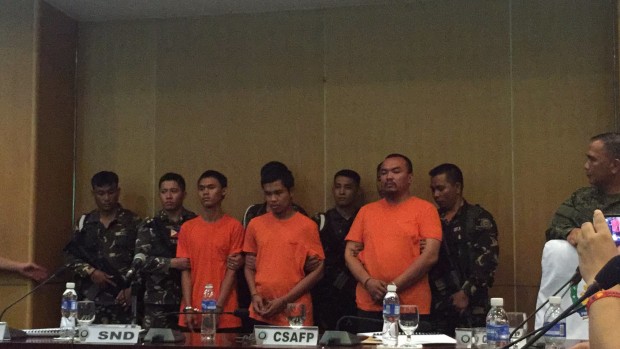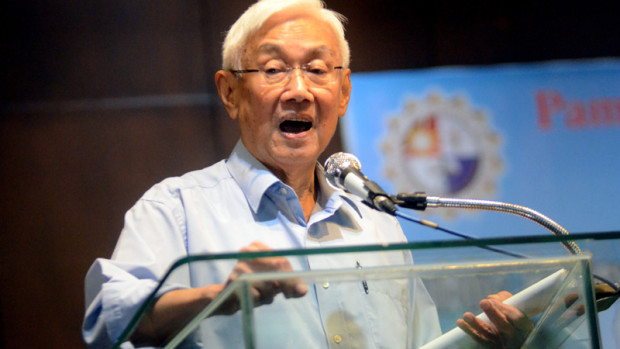
Image: Presidential Communications Operations Office
President Rodrigo Duterte of the Philippines is no stranger to controversy. Some of his greatest hits include a pledge to kill 100,000 criminals while in office, jokes about the rape of an Australian missionary, boasts of Davao City’s “liquidation squads” while he was mayor, and even cursing Pope Francis.
Since taking office in June of 2016, Duterte’s rhetoric translated into action as he launched a “war on drugs.” According to most recent reports, his crackdown has led to the deaths of over 3,600 people.
After U.S. Ambassador Philip Goldberg and President Obama raised concerns over the dramatic rise of extrajudicial killings throughout the country, Duterte signaled that he might overhaul what he previously called an “iron clad” relationship.
The small town mayor turned president is not interested in adhering to international norms and now threatens to break up with his treaty ally over what he views is an infringement on his country’s domestic affairs. The latest demands from Malacanag Palace include the end of the Balikatan exercises and the immediate departure of U.S. special operations forces from Mindanao. Balikatan is annual bilateral exercise between Philippine and U.S. military forces that focuses on partnership, humanitarian assistance and disaster relief capabilities. The exercise has gone on for 32 iterations and is the cornerstone of U.S. security cooperation in Southeast Asia. Meanwhile, a small contingent of U.S. special operations forces continues to work with Philippine security forces in Mindanao to help advise and assist against terrorist organizations, build capacity, and provide medical expertise.
If the United States does not meet Duterte’s demands, at stake is the potential termination of the Enhanced Defense Cooperation Agreement (EDCA) and a potential realignment of relations with Russia and China. If this were to happen, it would rock the security architecture in Asia and U.S. strategy in the region.
Fortunately, cooler heads are likely to prevail. Defense Secretary Delfin Lorenzana has already walked back Duterte’s comments. And while at the Center for Strategic and International Studies, Foreign Secretary Perfecto Yasay provided a counter-balance to Duterte’s aggression. The main concern is over short-term effects of a rift with America’s most reliable regional partner in targeting transnational terrorism. As highlighted in Linda Robinson’s 2016 RAND report, U.S. special operations forces have worked alongside the Armed Forces of the Philippines (AFP) since 2002, assisting them in improving internal defense and civil-military operations capabilities. These combined efforts helped reduce the threat of transnational terrorism, militant freedom of movement, and the popularity of extremist views.
However, since the 2015 withdrawal of the U.S. Joint Special Operations Task Force-Philippines (JSOTF-P), terrorism in Mindanao has instead resurged with a vigor that has not been seen in years. Before the withdrawal, Abu Sayyaf Group ’s “for-profit terrorism” was mostly contained to the under-governed spaces of the Sulu Archipelago on the islands Jolo and Basilan. But in the last 18 months, the situation in the Southern Philippines has begun to deteriorate quickly. The kidnapping and subsequent beheading of Canadian citizen Robert Hall, coupled with recent bombing in Duterte’s home city of Davao, should serve as a warning. Abu Sayyaf now exhibits a sophistication and organizational reach across all of Mindanao.
Meanwhile, mainland Mindanao was the home of other separatist movements such as the Bangsamoro Islamic Freedom Fighters, a militant offshoot of the Moro Islamic Freedom Fighters, both of which provided safe haven to transnational terrorists. Some likely recall the group’s involvement in killing of 44 Philippine Special Action Force members during the raid to capture or kill one of the FBI’s most wanted terrorists, the Malaysian bomb maker Zulkifli bin Hir (a.k.a Marawan).
With the Moro Islamic Freedom Fighters seeking to enter into the political process through the Bangsomoro Basic Law and the death of Marawan, a power vacuum exists in Mindanao. Now, Abu Sayyaf looks to garner international backing under the “black flag” movement inspired by the Islamic State of Iraq and the Levant (ISIL). As highlighted in Charlie Winter’s War on the Rocks article, there has been increasing coordination, cooperation, and cohesion between jihadists in South East Asia and the Islamic State in Iraq and the Levant. As early as November of 2014, the Islamic State’s official spokesman, Abu Muhammad al-‘Adnani, made appeals to Filipinos to resist the crusaders.
This reciprocal relationship has been exacerbated with ISIL support to Abu Sayyaf’s leader Isnilon Hapilon’s, (aka Abu Abdullah al Filipini) who, as Winter later showed, has been referred to as “the mujahid authorized to lead the soldiers of the Islamic State in the Philippines” and “the emir.”
Under the leadership of Hapilon, other extremists such as Maute Group and Ansar Khalifah Philippines will follow Abu Sayyaf’s lead. Abu Sayaf and their cohort will capitalize on the fractured political system in under-governed spaces such as Lanao del Sur and the neglected porous border regions of the Sarangani coast to conduct more audacious attacks. If Duterte chooses to demand the withdraw of all U.S. forces at such pivotal time, we are likely to see a Islamist violence get worse in the Philippines in the coming year.
As pressure increases on ISIL in Iraq and Syria, the estimated 100 to 200 Filipino fighters will attempt to return home to help expand the “caliphate.” Given the influx of overseas foreign workers that have “broken travel” while in the Middle East, Philippine security and intelligence organizations are going to have a very challenging time tracking them. Further pressure from the Indonesian government will likely be a catalyst for increased cooperation with regional jihadist groups such as the East Indonesia Mujahideen. Simultaneously, support for ISIL will continue to grow through recruitment tailored toward jihad in the Philippines. The Philippines will see attacks in Manila’s national capital region and other major western tourist spots, such as Palawan. Failure to counter terrorism there will return the world to the time when extremists were able to use the entirety of the Mindanao to plan attacks on a global scale.
The hair-trigger decisions of Duterte only benefit extremists who hope to leverage a resurgence of violence and gain momentum towards more wicked transnational aspirations. His calls for a pullback make the U.S.-Philippine relationship weakest during a time that begs action, in a period where the long-time partners need to stand together balikatan kasama kapit bisig (shoulder to shoulder with linked arms). Cooler heads must prevail quickly or hundreds of bayani ng bansang Pililipinas (heroes of the Philippines) will have laid down their lives in vain.
[Ryan Rockwell is a captain in the U.S. Army. He is currently a graduate student at Georgetown University’s McCourt School of Public Policy and has served on four deployments to the Middle East, South Asia, and Southeast Asia (two to the Philippines). The views expressed in this article are those of the author and do not represent the views or policies of the Department of the Army, the Department of Defense, or the U.S. government.]













